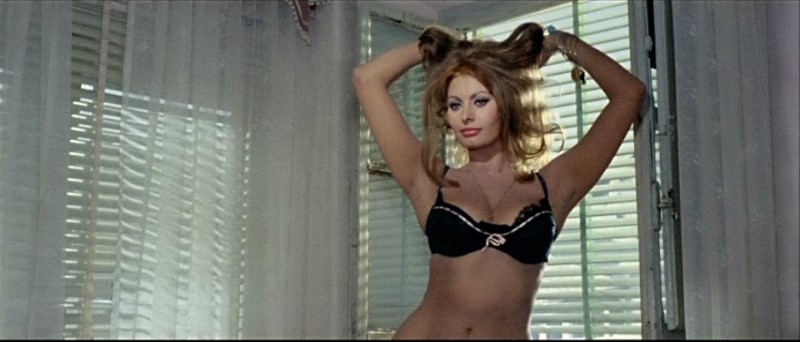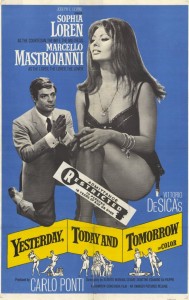|
Genres, Themes, Actors, and Directors:
- Comedy
- Episodic Films
- Italian Films
- Marcello Mastroianni Films
- Pregnancy
- Prostitutes and Gigolos
- Sophia Loren Films
- Vittorio de Sica Films
Review:
This episodic Italian sex comedy is primarily known today for two reasons: 1) as winner of 1963’s best foreign film Oscar, and 2) for Sophia Loren’s justifiably famous strip tease in front of Marcello Mastroianni’s howling suitor. As in any episodic film, some parts are inevitably better than others — the middle story here (“Anna of Milan”, at only 20 minutes) is widely regarded as the weakest, given that the storyline (such as it is) takes place exclusively during one car trip, and little to no character development occurs. The longer stories bookending the film — “Adelina of Naples” and “Mara of Rome” — offer a bit more comedic substance, and come across as innocuously enjoyable sketches. While “Adelina” offers a glimpse of de Sica’s erstwhile interest in social humanism (hard-working Adelina and her perpetually out-of-work husband continually flout authority — with our approval), for the most part Yesterday… remains “de Sica lite”, buoyed by its undeniable star power (Loren and Mastroianni are both in peak form) and by a liberal dose of cinematic escapism.
Note While some have argued that Yesterday, Today, and Tomorrow was just as much of a sexual tease for early-1960s audiences as its Doris Day counterparts in America, this isn’t quite true, given that sex-outside-of-marriage is paraded in all three vignettes as both normal and natural — except by characters (such as Ridolfi’s melodramatic grandmother, played by Tina Pica) who are clearly presented as shrewish and moralistically uptight.
Redeeming Qualities and Moments:
- Sophia Loren’s charismatic performances in all three vignettes — it’s easy to see why she was such an international superstar at the time

- Marcello Mastroianni as Loren’s three lovers

- Loren’s infamous strip-tease in front of Mastroianni’s howling john

- Armando Trovajoli’s musical score
Must See?
Yes, simply for its status as 1963’s best foreign film Oscar, and for Loren’s iconic strip-tease act.
Categories
Links:
|




One thought on “Yesterday, Today, and Tomorrow (1963)”
Not a must. Oscar-winning status notwithstanding, tiresome overall.
Loren and Mastroianni are indeed at their peak at this point in their careers, but they are feebly supported by the material they’re saddled with here. The first episode goes on waaay too long and its resolution is oddly abrupt and unconvincing. (And what’s with the traveling panoramic shot at the end?) Episode three is also lengthy for what it has to ‘say’ and, even though L&M seem to be having much fun, they’re clearly compensating for a weak script. As well, aside from her famous (tho ultimately tame) strip act, Loren somehow fails to persuade as a high-priced hooker.
Tho the middle (and, at 20 min., shortest) piece is largely considered the least interesting, I came away from the film finding it the most potent (tho that’s not a recommendation for taking in the entire film). We find out all we need to know about these two characters and the episode’s brevity (along with Loren’s turn as a spoiled socialite) becomes its strength. (I esp. like the added touch of Loren being unable to keep from bumping the car in front of her whenever she needs to stop her Rolls Royce.)
To be more memorable, this film needed to clock in at 90-or-so min. instead of two hours. And though there are clever lines in the dialogue throughout, the script needed more of them.
I don’t at all get why it was awarded an Oscar. Among other films, it was up against ‘Woman in the Dunes’ that year. ‘Woman…’ is certainly an odd film, and not to all tastes, but it’s also certainly a better film than ‘Y,T&T’.